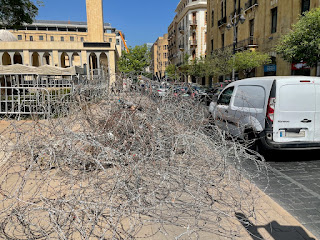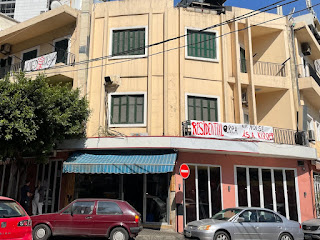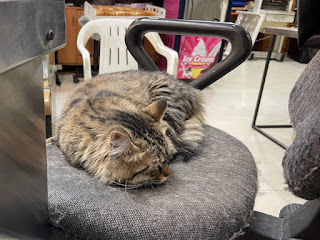50.Living in DIY-land (28 May 2022)
 |
A panel here, a panel there, and Nejmeh
Square is proclaimed "open"...
(26 May 2022 - Beirut)
|
In most places in the world, people
pride themselves on their DIY (do-it-yourself) skills and experience. Why have
other people build or fix things, when you can do it yourself? And you get a
greater appreciation for how things work, and the confidence that comes from
knowing that the quality of the work is up to your personal standards. Of
course, this is a “first-world” issue, because in much – if not most – of the
world there is no alternative to doing it yourself. It’s like those who go to
the gym to stay in good physical shape because they no longer move, bend, lift,
pull, push or sweat as part of their day’s work… contrasted with the rest of the world whose
survival depends on their physical engagement with every aspect of their lives.
 |
The elections came, and the elections went,
and now everyone waits to see what's next.
(14 May 2022 - Geitawi, Beirut)
|
And then there’s Lebanon. I need to
be circumspect about this because I signed a paper promising that I would
only say nice things about Lebanon. This is a DIY society for very different
reasons than the two categories mentioned above. People do a myriad of things
themselves because either the function in question was never done by the
authorities, or because the functions have stopped functioning, and now it’s up
to you to do things like store your own money, or generate your own electricity,
or import your own medicines, or provide security for your family, and so on. And
if you examine the extensive network of services for the refugee population
(probably a quarter of the total population), you will find networks of aid
agencies, each with its particular emphasis. Essentially, today’s population is
living in DIY-land.
 |
It's amazing; every day it fills up, and every
night it gets emptied! What manner of sorcery
is this? (16 May 2022 - Geitawi, Beirut)
|
There are also many functions that
were never done by the state, which explains why there are so many organizations
identifiable by a particular socio-religious coloring. Let’s keep in mind that
this was a “gift” left by France as it ended its mandate over Lebanon in 1943;
namely to create a government consisting not of capable citizens, but of mandated
religious representatives, in order to make it as difficult as possible for any
one group to have authority over another. Or that was the plan, anyway. It
ended up being a wide gate to nepotism and cronyism, and public service jobs are
bloated by people getting paid to fill quotas, not to provide services. It also
made each religious grouping look out for its own, reinforcing people’s view that
only one’s own group will look out for them.
 |
Anyone want to take some for DIY crowd
control? (26 May 2022 - Beirut)
|
And so each socio-religious
community has its own old age home (Armenians have CAHL) and other hospital
services (Armenians have the Armenian Sanatorium, and Armenian Evangelicals used
to have the Christian Medical Center – housed in the building where we now
live). Armenians as well as others have an assortment of relief and socio-medical
centers catering mostly to their own groups. They each have their network of
parochial schools and institutions of higher education. They have their own
press, and their own television and radio stations. They also have their own demographic
regions, though in the pre-civil war days there was more admixture between
groups, blurring those lines a bit. There is not much one can point to and say,
“This is for all.”
 |
DIY noise control by the unfortunate residents
of the boisterous (until 4 a.m.) pub street, "rue
Armenie". (26 May 2022 - Mar Mikhael, Beirut)
|
So, the parliamentary elections came
and went. And there were small shifts in power bases, including some
disorganized “revolution” people. But few are expecting significant changes. In
an act of low drama, the outgoing (who is also the incoming) speaker “approved”
the removal of metal and concrete barriers that have surrounded the parliament since
the uprising began 2-1/2 years ago, as if to herald a new day of openness and
prosperity for Lebanon and its capital city – supervised by the old guard. This,
as the simple majority of hungry and unemployed citizens (and others) turns into
an overwhelming majority. And as the currency continues its death-dive,
something that economic experts consider to have no economic basis for
occurring, only political. And as those who impoverished Lebanon continue to
claim to be her saviors.
 |
Preparing KCHAG for energy independence.
(22 May 2022 - Monteverde)
|
In recent days government officials have
continued to express the DIY-ness of today’s Lebanon. Some obscure decision was
taken by the Central Bank, and the currency magically improved. A new electronic
platform was released for shoppers to report price-gouging at supermarkets. Bank
heads are advising people not to keep their cash under a single mattress, but
to spread it out throughout all their bedrooms. Governmental security heads are
warning people to keep their valuables in various places, and not just in one
old purse in the back of a closet. The population has gradually resigned itself
to the permanent absence of municipal electricity and the ever-increasing cost
of diesel fuel running the DIY generators (called “ishtirak” – see Jan. 2022
blog: “Power-Hungry”) in each neighborhood, so that throughout the country
solar panel installations are sprouting up, raising the hopes of some that they
will be able to live somewhat “normally”.
 |
The ultimate in DIY-ing:
a flea market! (26 May 2022 -
Nor Hadjin, Beirut)
|
Surveying such rough terrain, in
which the country’s DIY-ers live either with endless discouragement or
self-delusion, or alternate between the two, the points of light are
challenging to discern. More than any other place, I see them among teachers
and others who express a heartfelt commitment to serve others. In the case of
teachers, there are some so discouraged that they can no longer give what a
teacher must give and a student must have. But there are many others who continue
to challenge their students to think and grow, facing not just the negativity
of students who say, “What’s the use?” but also that of the discouraged parents who
transmit their hopelessness to their children. Once the complaint was about the
”burden” of the Armenian curriculum; now the entire curriculum is often
questioned by those who only want to find a way out of their misery. Teachers
are the front-line workers, who should be given standing ovations at the end of
every school day, for continuing to believe in the future of the children they educate,
and especially for those teachers who continue to believe in the importance of
an Armenian education (a topic for another time).
 |
LebCat 50: "If you want to run a store the
right way, you have to do it yourself!"
(17 Mar. 2022 - Geitawi, Beirut)
|
Along with teachers being front-line,
essential personnel, there are also those committed to serving others, whether
in health care, or social work, or ministry, or even just being a good neighbor,
keeping an eye out for those whom they see silently suffering. They, too, should
be regularly applauded and encouraged. A doctor recently told me, “I should
thank the country for teaching me how to prepare for a retirement without any
money!” But he and so many others continue to use their skills and their hearts
to help those around them. Lebanon is the ideal place to come and learn what it
means to serve others, and to receive your reward from the One who came not to
be served, but to serve. Though it is easy to slip into discouragement
ourselves, Maria and I try our best to be encouragers. This is not a DIY job,
because we don’t have the resources to last. Surrounding us there is the
church, whose members rely on the prayers of many and renewal from above. And there
is Christ, who Did It Himself, going through all of this, and more, to bring
light out of the darkness! [LNB]








No comments:
Post a Comment